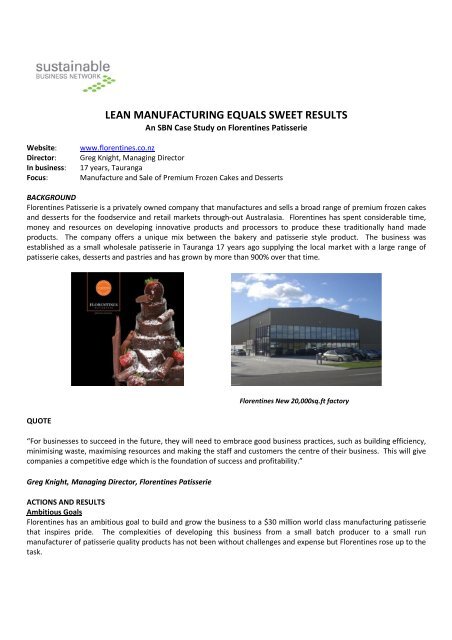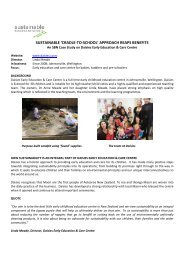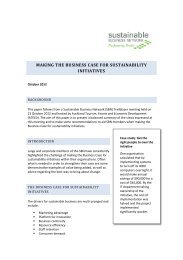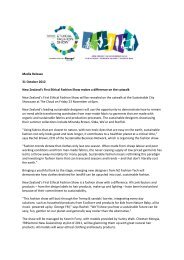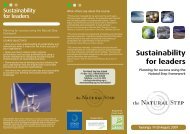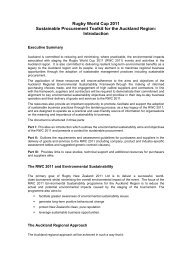Florentines Patisserie - Sustainable Business Network
Florentines Patisserie - Sustainable Business Network
Florentines Patisserie - Sustainable Business Network
Create successful ePaper yourself
Turn your PDF publications into a flip-book with our unique Google optimized e-Paper software.
LEAN MANUFACTURING EQUALS SWEET RESULTS<br />
An SBN Case Study on <strong>Florentines</strong> <strong>Patisserie</strong><br />
Website: www.florentines.co.nz<br />
Director: Greg Knight, Managing Director<br />
In business: 17 years, Tauranga<br />
Focus: Manufacture and Sale of Premium Frozen Cakes and Desserts<br />
BACKGROUND<br />
<strong>Florentines</strong> <strong>Patisserie</strong> is a privately owned company that manufactures and sells a broad range of premium frozen cakes<br />
and desserts for the foodservice and retail markets through-out Australasia. <strong>Florentines</strong> has spent considerable time,<br />
money and resources on developing innovative products and processors to produce these traditionally hand made<br />
products. The company offers a unique mix between the bakery and patisserie style product. The business was<br />
established as a small wholesale patisserie in Tauranga 17 years ago supplying the local market with a large range of<br />
patisserie cakes, desserts and pastries and has grown by more than 900% over that time.<br />
QUOTE<br />
<strong>Florentines</strong> New 20,000sq.ft factory<br />
“For businesses to succeed in the future, they will need to embrace good business practices, such as building efficiency,<br />
minimising waste, maximising resources and making the staff and customers the centre of their business. This will give<br />
companies a competitive edge which is the foundation of success and profitability.”<br />
Greg Knight, Managing Director, <strong>Florentines</strong> <strong>Patisserie</strong><br />
ACTIONS AND RESULTS<br />
Ambitious Goals<br />
<strong>Florentines</strong> has an ambitious goal to build and grow the business to a $30 million world class manufacturing patisserie<br />
that inspires pride. The complexities of developing this business from a small batch producer to a small run<br />
manufacturer of patisserie quality products has not been without challenges and expense but <strong>Florentines</strong> rose up to the<br />
task.
Introduction of Lean Manufacturing<br />
Management recognised early on that it was important for the company to consolidate its position after 3 years of<br />
aggressive sales growth and concentrate on the internal robustness of the business. In February 2010, Lean<br />
Manufacturing i was implemented into the business to cope with system issues faced by having a larger range and<br />
production facility.<br />
<strong>Florentines</strong> was clear that they wanted to survive the difficult change from a small batch producer to a larger<br />
manufacturer and the productivity improvement project was implemented throughout the company. Lean<br />
manufacturing has been a large part of helping <strong>Florentines</strong> to scale up and re-design almost all facets of the business.<br />
The company has implemented change across the entire company from the business structure, production processes,<br />
warehouse systems, finished products inventory, new products, accounting practices, and sales and marketing. This<br />
helped give a clear focus and strategy to help the company improve its profitability.<br />
Staff Training<br />
<strong>Florentines</strong> realised early on in the Lean process that productivity was going to be a large factor in helping the company<br />
survive and prosper. Most of the products are hand-made and without the correct flow and procedures, competing in<br />
the marketplace would be difficult if not impossible.<br />
A considerable amount of time was spent on staff training around continuous improvement. In less than a year, over<br />
150 continuous improvement ideas were suggested and almost all of these were implemented.<br />
Creation of New Roles<br />
An existing staff member, experienced in production planning and lean processes, was re-stationed into the production<br />
planning role with a view to improving the production processes and systems. Significant improvements were made in<br />
this area. Another person was employed to take over many of the production planning tasks so that the experienced<br />
staffer could further develop the productivity programme that has been set up. These are both new roles and huge<br />
resources have been allocated to this programme of continuous improvement.<br />
Change Management<br />
<strong>Florentines</strong> realised early on that the change couldn’t be imposed upon the staff but rather they needed to buy into the<br />
change and lean process. Although not initially easy, it was supported by the management team’s determination and<br />
patience. To better facilitate this change process, and so that the managing director could spend the considerable time<br />
required with the staff, a person was employed to take on his role in the sales and marketing department.<br />
After a large amount of staff awareness training and knowledge building, <strong>Florentines</strong> worked hard on aligning the aims<br />
and values of the business with the needs of staff. Again, much of this was done with staff consultation. Although still in<br />
the early stages of this change process, the business believes in continuous learning and incremental improvement.<br />
<strong>Florentines</strong> is now in the process of breaking down its strategic vision into smaller measurable KPI’s and performance<br />
measures.<br />
Sustainability Measures<br />
• Moved from plastic milk bottles to bags even though they are more expensive. This saved one large rubbish bin<br />
and pick-up per week.<br />
• Implemented a recycle bin for all cardboard products.<br />
• Changed to a new supplier that used recycled cardboard for all cake packaging.<br />
• Purchased new freezer equipment that has reduced power bill from $1.01 per square foot to $0.32 per square<br />
foot.<br />
• Moved from having four colour printers throughout the business to one more efficient colour printer which has<br />
saved 30% in costs over the last three months.<br />
• Any waste food products is now given to pig farmers instead of dumping.<br />
• All staff are encouraged to turn off all computers etc. prior to leaving for home.
• Staff are encouraged to turn all lights off in rooms not being currently used i.e. toilets, changing rooms, staff<br />
room, hallways and warehouse.<br />
• Only fuel efficient cars are purchased and are kept regularly serviced.<br />
• Suppliers are chosen based on commitment to sustainability principles where possible.<br />
Some Results Highlights<br />
• Increased production efficiencies, improved stock management and enhancement of strategic supplier<br />
relationships have allowed <strong>Florentines</strong> to reduce stock levels by 24% since 31 March 2011. This has dramatically<br />
assisted the cash-flow position of the company.<br />
• The recognition that contract manufacturing held huge potential and made easier through lean manufacturing<br />
resulted in <strong>Florentines</strong> gaining a contract supply for one of the largest café chains in Australia with over 500<br />
stores.<br />
• Liaising with customers and striving to better understand their needs has led to the development of a low fat,<br />
low sugar, high fiber products for hospitals and rest homes (new market).<br />
• The implementation of small changes suggested by staff has benefited the company hugely with estimated<br />
savings of over $100,000 this year.<br />
• <strong>Florentines</strong>’ lead time has always been 4 days. 18 months ago, the business struggled to maintain a 60-70%<br />
DIFOT (Delivered In Full, On Time). Although it has maintained a 4 day lead time KPI, the business now has an<br />
almost 100% DIFOT and most of the product is dispatched the next day.<br />
• Customer feedback is seen as a valuable resource and has been used extensively to build the business. Over 71<br />
changes have been made to the product range in the last six months as a result. In the last 6 months,<br />
<strong>Florentines</strong> has had to increase the R&D department to three people in order to keep up with the development<br />
of new product and product changes from customer requests.<br />
• Variable expenses as a percentage of sales have dropped by 29% since 2010.<br />
• Fixed expenses have been reduced by 24% since 2010.<br />
AWARDS<br />
• 2011 BOP SBN Awards Productivity Award ii : Winner<br />
JUDGES’ COMMENTS<br />
• Integration of productivity tools were evident in every aspect of the business with every staff area and<br />
workplace, whether management or factory floor.<br />
• The vision for <strong>Florentines</strong> is shared throughout the business and staff are kept well-informed on progress against<br />
the vision.<br />
• Extremely strong leadership and commitment is displayed from the top and productivity improvement is driving<br />
the growth and sustainability of the company.<br />
• The staff is increasingly empowered through the new systems to identify and solve problems independently.<br />
• A focus on productivity improvement has created an environment where the planning tools are in place to cope<br />
with large orders.<br />
i<br />
"Lean," is a production practice that considers the expenditure of resources for any goal other than the creation of value for the<br />
end customer to be wasteful, and thus a target for elimination.<br />
ii<br />
The Productivity Award is sponsored by New Zealand Trade and Enterprise. It is specifically targeted towards businesses which<br />
have embraced business practices - such as lean, or any other systems - that have allowed them to increase their output<br />
without increasing resource use, waste, or time.


